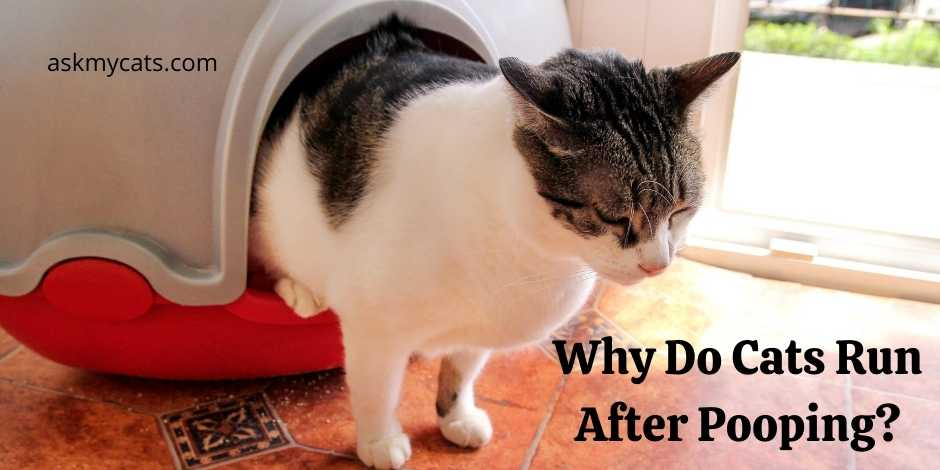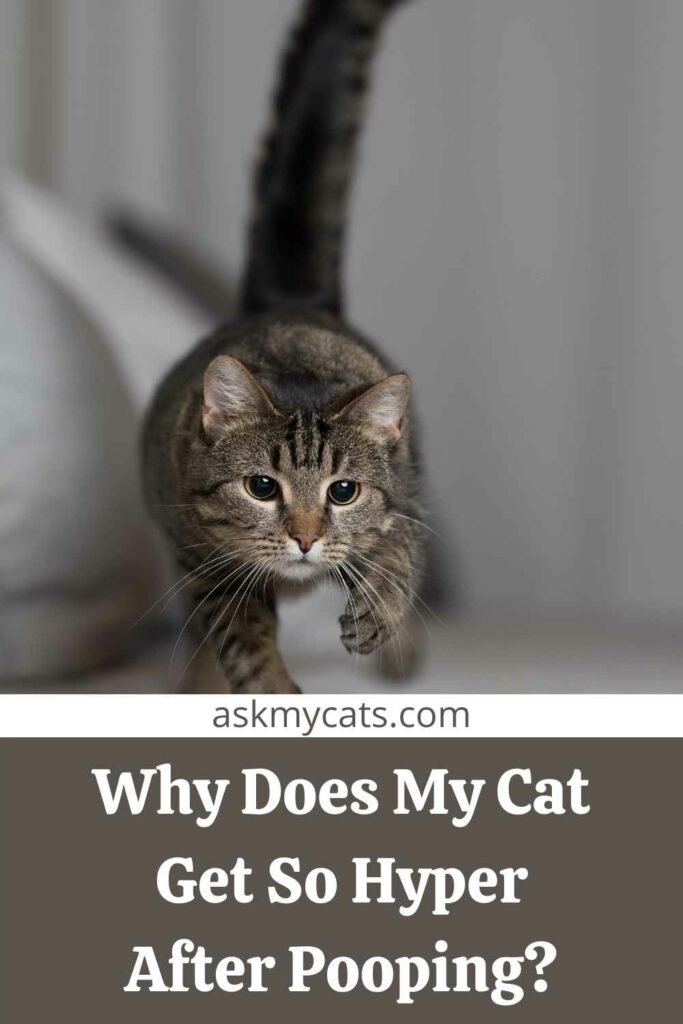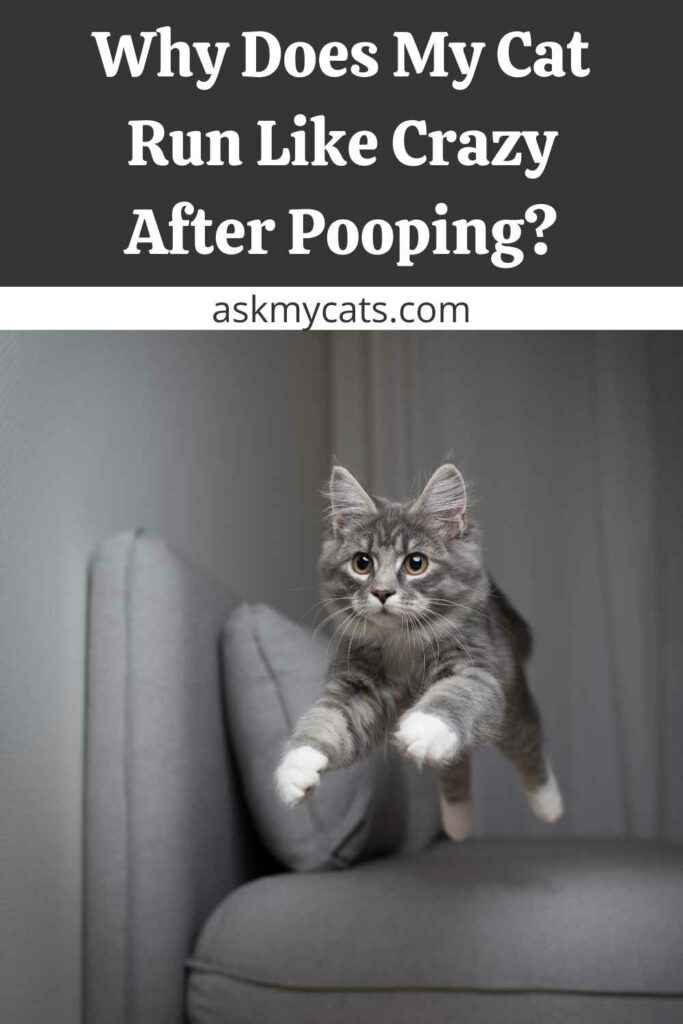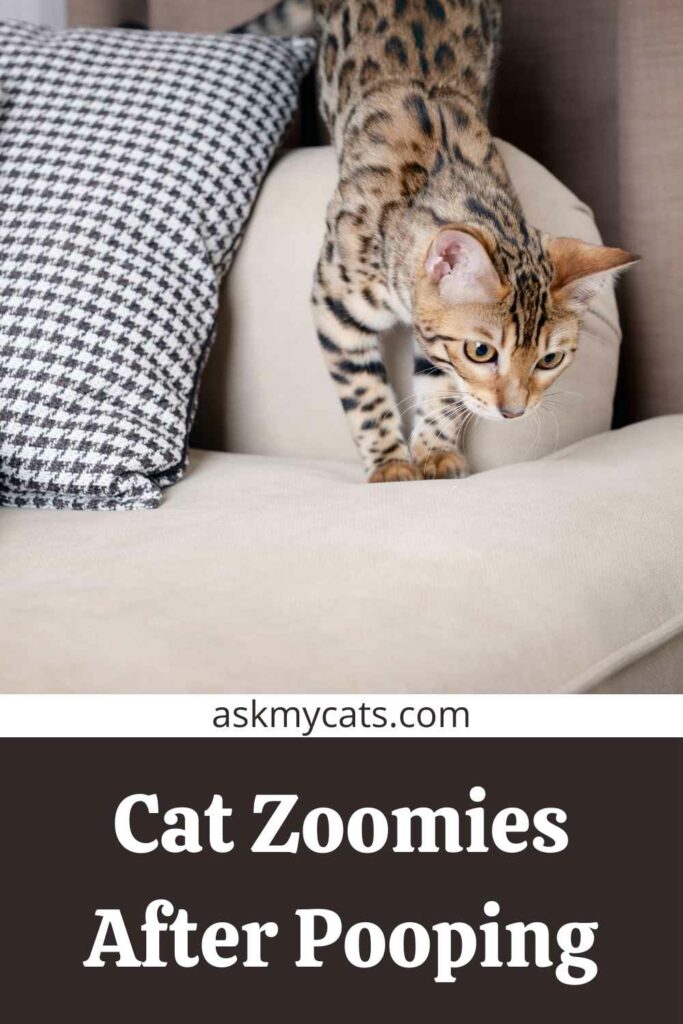Cats, despite their attempts to portray themselves as the more respectable pet species, have their own set of pooping habits. One of the most common is that some cats go a little crazy and run after pooping in their litter box.
Many cat owners have certainly seen that after defecating, their cat dashes out of the litter box.
Cats run here and there after pooping in order to avoid predators. Cats in the wild usually bury their excrement to hide their scent and put predators off their trail.
In this article, we are going to discuss all about the reasons why a cat runs and acts weird after pooping.


Give Your Cat the Perfect Day
Get the Free Ebook!
Why Does My Cat Get So Hyper After Pooping?
Your cat gets hyper after pooping because their vagus nerve which runs from their brain stem gets stimulated after pooping.

Cats are known for engaging in bizarre behavior, such as engaging in a lethal fight with their own tail or pouncing on unsuspecting humans. One of their strangest habits is sprinting from their litter box like a greyhound after passing gas.
Is it possible that they’re fleeing their own feces? Is there a feeling of exhilaration as a result of the waste removal?
Some animal behaviorists believe that a cat sprinting after a deposit is motivated by a worry that a predator would follow them down based on the scent of their feces.
However, experts are keen to point out that they have never seen cats flee their BMs in the wild.
Another idea contends that cats that were accustomed to having their rear ends rubbed by their mothers after defecating as kittens are demonstrating their independence by racing away, their butts having developed self-cleaning qualities in maturity.
You could come up with a better idea: A vagus nerve runs from the brain stem of both humans and cats.
Defecation can activate the nerve in both species, resulting in a delightful experience and what some have dubbed “poo-phoria,” or post-poop happiness. Running may just be a way for the cat to expend surplus energy caused by nerve stimulation.
The idea that highly clean cats would just wish to shake off extra litter or feces by running a 100-meter race, or that they’re seeking to flee from some discomfort caused by a digestive condition, is less intriguing.
Because there has been so little research into pooping cat mania, there is no widely acknowledged answer. A definite motivation, like so much else about cats, will have to remain a mystery.
You might also like to read about how do cats clean themselves after pooping
Why Does My Cat Run Like Crazy After Pooping?
Cats run like crazy after pooping just to shake off and clean the waste matter.

Kittens’ rear ends are usually licked clean by their mothers before and after they defecate. This is done to encourage them to eliminate and then clean up after themselves.
Adult cats celebrate or flaunt their freedom by sprinting or jumping in the air after pooping. Maybe they’re pleased that they can now scrub their own bums!
Cats who run away from the litter box after pooping may be attempting to maximize their chances of survival by getting as far away from their droppings as possible. Predators would have a tougher time tracking them down.
Less confident cats in multi-cat families may bury their excrement and then dash away to let other cats know they aren’t a threat.
Keep an eye on your cats to make sure one isn’t tormenting the other while she’s in the litterbox or chasing her away once she’s finished. If not addressed by introducing an additional litter box to the family, this might lead to issues such as incontinence.
Another theory regarding cat zoomies after pooping is that cats are clean creatures that just wish to get rid of any extra litter or feces.
Jumping and running after using the litter box helps to shake off any debris stuck to their feet or other areas of their bodies, so it’s possible that it merely makes your cat feel cleaner.
When your cat sprints away from the litter box, they are rapidly separated from their stinky excrement, which they want to avoid. Cats, after all, are meticulously clean creatures who never sleep or dine near their waste.
Cat zoomies may occur after pooping because cats, like so many of us in the animal community, like the feeling of pooping.
The vagus nerve is found in both humans and cats, and it is triggered by feces. Your cat may experience exhilaration after pooping as a result of this.
The activation of this nerve may invigorate cats, prompting them to expend that energy by engaging in one of their favorite activities: rushing around the home. It’s a method for them to show off how joyful they are.
If your cat runs away from the litter box and cries after elimination, it might be suffering from a medical condition. This is especially true if this is the first time you’ve seen this sort of conduct.
When cats are in pain while eliminating, they may flee the box and avoid it in the future, connecting the box with the agony. Visit your veterinarian to rule out a medical explanation for your cat’s strange behavior in order to tackle these sorts of litter box concerns.
You might also like to read about why does my cat play with his poop
Cat Zoomies After Pooping
If your cat gets zoomies after pooping it’s conceivable that your cat has an irritated colon, an anal fissure, or another medical problem that makes pooping difficult.

If your cat scratches after pooping or his poop zoomies are a new activity, you should get him examined by a veterinarian to rule out a medical problem.
After using the litter box, many cats appear to do a victory lap. Some cats may rush around like crazy after having a bowel movement, especially if it was unpleasant. Infections or inflammatory processes involving the urinary system, colon, or rectum may cause pain.
It might possibly be the result of constipation. If your veterinarian eliminates out medical causes for your cat’s post-bathroom running, you may assume it’s simply your cat’s way of applauding a job well done.
After a lengthy nap, cats frequently get the zoomies. Cats sleep for a large portion of the day to preserve energy (they may sleep anywhere from 12 to 16 hours each day), so when they’re awake, they’re very alert.
Running from one end of the house to the other after a lengthy catnap is a great method for your cat to re-energize their mind and body.
Cats, although receiving all of their food from their pet owners, are natural hunters with a predatory nature. It may appear that your cat is chasing nothing when, in reality, they are hunting phantom prey.
To get a feel of your cat’s hunting prowess, drop a few bits of kibble down the corridor and watch how quickly they chase it down.
According to one idea, cats run away from their feces as a natural reflex to avoid predators. The theory is that cats in the wild bury their excrement to keep predators away from their scent.
Also, check out reassons behind cat runs out of litter box while pooping
They’re fleeing for two reasons. The first reason is that they want to keep their distance from the proof. The second purpose is to get away from predators by escaping their smell.
This is only a hypothesis. The truth is that some cats experience the zoomies after using their litter box, while others do not.
Cats are hygienic creatures that will avoid anything that they regard to be “unclean.” It’s possible that you haven’t cleaned their litter box in a while, and your cat doesn’t like the filthy litter.
They’ll go about their business as usual, but they’ll also strive to get out of the box as fast as possible. As a result, you’ll be able to watch the zoomies in action.
It’s also possible that you’ve lately altered their litter and they’re displeased with the change.
Although the good kitty will continue to use the box, zooming after pooping is a method for them to express their dissatisfaction. This problem can also be caused by having too many cats and not enough litter boxes.
Another idea for why a cat gets the zoomies after pooping has been proposed by behaviorists. It’s possible that they wish to brag about their accomplishment.
During kittenhood, the mother cat must lick the bottom area of her kittens to get them to defecate. Because the kittens’ muscles have not yet matured, they will have difficulty beginning bowel movements on their own.
It’s a special event now that the cat has grown up and is able to use the litter box on its own. They want to brag about their achievements and independence, and they want our praise.
The reason cats automatically bury their excrement is to hide their scent, in case you didn’t already know. This reduces the likelihood of a predator tracking them down.
It’s also been hypothesized that a cat sprints around after pooping to spread its odor and confound any potential predators.
They also strive to flee in order to avoid leaving any proof that they were formerly where they were. This notion remains debatable, as not every cat does the cat zoomies after using the litter box.
Furthermore, the cat is the most defenseless and accessible target for assault at toilet time. In order to avoid being attacked suddenly, your cat may try to do the job fast and go.
If your cat rushes away in pain after passing a stool, there’s a good likelihood they’re suffering from underlying health problems. It’s possible that the cat is in pain, itching, or having trouble pooping in general.
This is caused by potential rectum irritation and infections. The zoomies are supposed to make it easier for them to defecate. It’s also possible that your cat is infected with worms. Look for any odd signs in their feces, such as diarrhea, blood, or constipation.
Cat Runs Out Of Litterbox After Peeing
If a cat runs out of his litter box after urinating, it’s possible that he is facing some underlying urinary-related medical issues.
Urinary tract infections, discomfort, inflammation, bladder stones, or even a blockage are examples of such medical conditions. As a result, if your cat exhibits unusual behavior, you should take him to the veterinarian for an examination to see what is causing it.
Cats want a clean environment for peeing, much as some people prefer to flush before going so they may discharge in a clean bowl. It’s possible that darting out of the litter box after going is their way of avoiding the filth at breakneck speed.
Why Do Cats Run After They Pee?
In the wild, the scent of excrement and urine might attract predators, so it’s natural to want to get away from that risk as soon as possible. Since cats are predators in every sense of the word, they follow this behavior even indoors.
Zoomies are a normal part of being a cat, whether they occur after a litter box or at random. Cats racing after using their litter boxes or experiencing the zoomies, in general, are natural habits, and there’s no reason to be concerned.
What you should look out for is if your cat refuses to use the litter box, acts as if they’re trying to avoid it completely, or tries to hide soon afterward.
Frequently Asked Questions
Why do cats run away from the litter box after using it?
Cats just feel better once they have relieved themselves. Cats are “flaunting” their adult freedom by not needing mothers to clean up after them. Cats desire to be recognized for their achievements. Cats with stomach issues want to get away from it as quickly as possible.
What is a cat Zoomie?
There are a variety of terms for the time of day, generally early in the morning or evening, when your cat runs madly about the home for no apparent reason: cat zoomies, mad-half hour, climbing up the walls. A ‘frenetic random activity period,’ or FRAP, is another name for this type of behavior.
Why do cats yell after pooping?
After using its litter pan, a cat that meows loudly may be notifying you that it has gone to the bathroom. Because no cat likes to use a dirty litter box, it’s signaling that it’s time for you to clean it up. Some cats are more talkative than others. They prefer to keep their owners informed about their behaviours and objectives.
Final Words
Running after poop is an activity inspired by delight and a sense of accomplishment at having relieved our cats of an urgent need.
Running after a poop, according to some experts, might indicate an illness, irritation, or even an injury to the cat’s anus. Running is a popular coping mechanism for anxiety and even pain.
Leave your questions in the comments section below.
